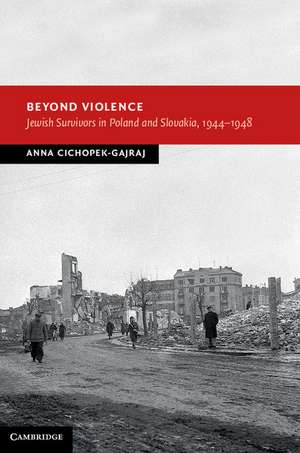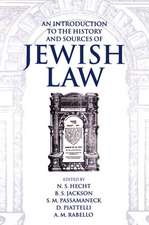Beyond Violence: Jewish Survivors in Poland and Slovakia, 1944–48: New Studies in European History
Autor Anna Cichopek-Gajrajen Limba Engleză Hardback – 18 iun 2014
Din seria New Studies in European History
-
 Preț: 238.02 lei
Preț: 238.02 lei -
 Preț: 237.92 lei
Preț: 237.92 lei -
 Preț: 208.49 lei
Preț: 208.49 lei - 9%
 Preț: 593.70 lei
Preț: 593.70 lei -
 Preț: 398.41 lei
Preț: 398.41 lei -
 Preț: 177.91 lei
Preț: 177.91 lei -
 Preț: 211.13 lei
Preț: 211.13 lei - 9%
 Preț: 592.60 lei
Preț: 592.60 lei -
 Preț: 169.70 lei
Preț: 169.70 lei -
 Preț: 166.99 lei
Preț: 166.99 lei -
 Preț: 266.53 lei
Preț: 266.53 lei -
 Preț: 241.90 lei
Preț: 241.90 lei -
 Preț: 429.99 lei
Preț: 429.99 lei -
 Preț: 400.05 lei
Preț: 400.05 lei - 11%
 Preț: 698.50 lei
Preț: 698.50 lei -
 Preț: 275.85 lei
Preț: 275.85 lei -
 Preț: 330.09 lei
Preț: 330.09 lei - 11%
 Preț: 695.93 lei
Preț: 695.93 lei -
 Preț: 423.10 lei
Preț: 423.10 lei -
 Preț: 340.13 lei
Preț: 340.13 lei - 11%
 Preț: 698.30 lei
Preț: 698.30 lei -
 Preț: 326.82 lei
Preț: 326.82 lei -
 Preț: 339.37 lei
Preț: 339.37 lei -
 Preț: 396.59 lei
Preț: 396.59 lei -
 Preț: 383.48 lei
Preț: 383.48 lei -
 Preț: 292.40 lei
Preț: 292.40 lei - 14%
 Preț: 682.94 lei
Preț: 682.94 lei -
 Preț: 282.75 lei
Preț: 282.75 lei -
 Preț: 417.07 lei
Preț: 417.07 lei -
 Preț: 437.18 lei
Preț: 437.18 lei - 14%
 Preț: 873.67 lei
Preț: 873.67 lei -
 Preț: 420.40 lei
Preț: 420.40 lei -
 Preț: 319.99 lei
Preț: 319.99 lei - 14%
 Preț: 687.39 lei
Preț: 687.39 lei -
 Preț: 397.01 lei
Preț: 397.01 lei - 11%
 Preț: 695.93 lei
Preț: 695.93 lei - 11%
 Preț: 543.84 lei
Preț: 543.84 lei
Preț: 695.93 lei
Preț vechi: 781.95 lei
-11% Nou
Puncte Express: 1044
Preț estimativ în valută:
133.18€ • 138.87$ • 110.69£
133.18€ • 138.87$ • 110.69£
Carte tipărită la comandă
Livrare economică 21 martie-04 aprilie
Preluare comenzi: 021 569.72.76
Specificații
ISBN-13: 9781107036666
ISBN-10: 1107036666
Pagini: 297
Dimensiuni: 160 x 234 x 20 mm
Greutate: 0.57 kg
Ediția:New.
Editura: Cambridge University Press
Colecția Cambridge University Press
Seria New Studies in European History
Locul publicării:New York, United States
ISBN-10: 1107036666
Pagini: 297
Dimensiuni: 160 x 234 x 20 mm
Greutate: 0.57 kg
Ediția:New.
Editura: Cambridge University Press
Colecția Cambridge University Press
Seria New Studies in European History
Locul publicării:New York, United States
Cuprins
Introduction; 1. Return to 'no home'; 2. Property: Poland; 3. Property: Slovakia; 4. Violence; 5. Citizenship; 6. Return to 'normality': Poland; 7. Return to 'normality': Slovakia; Conclusion; Appendices; Bibliography.
Recenzii
'This well-researched and innovative volume provides a vivid account of the attempts to revive Jewish life in Poland and Slovakia. It shows clearly that, in spite of the increasingly repressive nature of the communist governments of these countries and the persistence of anti-Jewish violence, these efforts, although ultimately frustrated by the political situation, initially had a significant degree of support. It is essential reading for all those interested in Jewish life in Eastern Europe after the Second World War.' Antony Polonsky, Albert Abramson Professor of Holocaust Studies, Brandeis University, Massachusetts, and United States Holocaust Memorial Museum
'Beyond Violence is an important, and very well researched addition to existing literature on the consequences of the Second World War and the Holocaust.' Jan Gross, Norman B. Tomlinson '16 and '48 Professor of War and Society, and Professor of History, Princeton University, New Jersey
'Beyond Violence is a refreshingly original book that analyzes and compares the experience of Jews in postwar Poland and Slovakia. The author argues against the grain for a focus on Jews' attempts to reconstruct their past existence and build new lives in the aftermath of the Holocaust. Pushing us beyond pogroms to questions of property, employment, marriage and religious life, the author paints a far more textured canvas of Jewish life than has been generally portrayed in the literature. The manuscript does not minimize the violence, but contextualizes it as one of many aspects in postwar life and not always the most important. Cichopek-Gajraj deserves high praise for her insightful comparative history of such a complex, sensitive and traumatic time.' Benjamin Frommer, Director, Holocaust Educational Foundation, and Charles Deering McCormick Associate Professor of Teaching Excellence, Northwestern University, Illinois
'… a brilliantly documented piece of cutting-edge research.' Lukasz Krzyzanowski, Polish-Studies.Interdisciplinary (www.pol-int.org)
'… the greatest achievement of Beyond Violence is the careful comparative analysis revealing specific differences between the early postwar experiences of Polish and Slovak Jews in a broader political and social context … [This book is] highly recommended not only for scholars and students of east European Jewish history and the Holocaust, but also for scholars and students of other twentieth century genocides for whom Beyond Violence could serve as an inspiring comparative case.' Joanna B. Michlic, Slavic Review
'Cichopek-Gajraj skillfully uncovers a complex of social, legal, material, and political dynamics conditioning the return of Jewish survivors, old and new forms of antisemitism, the persistent efforts of many Jews to secure their property or even citizenship, and their pursuit of renewed normality. The book highlights the reality that their hopes were often frustrated by non-Jews' investment in their absence, by the broader distrust of minorities, by the new Communist 'internationalism,' and by the postwar authorities' inability or unwillingness to protect their Jewish citizens.' Tatjana Lichtenstein, Holocaust and Genocide Studies
'Violence and emigration have become the dual pillars of the postwar Jewish Holocaust survivor narrative. Yet, as Anna Cichopek-Gajraj argues in her compelling and sensitively written volume, we must go 'beyond violence' to understand the Jewish Holocaust survivor experience. While Cichopek-Gajraj acknowledges violence as an inescapable feature of the postwar environment, she deftly draws us into survivors' everyday struggles to rebuild their lives and adapt to the upended world in which they find themselves.' Rebekah Klein-Pejšová, Journal of Modern History
'Beyond Violence is carefully researched and well written, while remaining fresh and innovative. It is a very important contribution to the field and is a must-have for scholars, especially due to the revisionist tactics of certain governments. But beyond academia this book is recommended for everybody interested in Jewish and East European history.' Piotr J. Wrobel, Central Europe Journal
'Beyond Violence is an important, and very well researched addition to existing literature on the consequences of the Second World War and the Holocaust.' Jan Gross, Norman B. Tomlinson '16 and '48 Professor of War and Society, and Professor of History, Princeton University, New Jersey
'Beyond Violence is a refreshingly original book that analyzes and compares the experience of Jews in postwar Poland and Slovakia. The author argues against the grain for a focus on Jews' attempts to reconstruct their past existence and build new lives in the aftermath of the Holocaust. Pushing us beyond pogroms to questions of property, employment, marriage and religious life, the author paints a far more textured canvas of Jewish life than has been generally portrayed in the literature. The manuscript does not minimize the violence, but contextualizes it as one of many aspects in postwar life and not always the most important. Cichopek-Gajraj deserves high praise for her insightful comparative history of such a complex, sensitive and traumatic time.' Benjamin Frommer, Director, Holocaust Educational Foundation, and Charles Deering McCormick Associate Professor of Teaching Excellence, Northwestern University, Illinois
'… a brilliantly documented piece of cutting-edge research.' Lukasz Krzyzanowski, Polish-Studies.Interdisciplinary (www.pol-int.org)
'… the greatest achievement of Beyond Violence is the careful comparative analysis revealing specific differences between the early postwar experiences of Polish and Slovak Jews in a broader political and social context … [This book is] highly recommended not only for scholars and students of east European Jewish history and the Holocaust, but also for scholars and students of other twentieth century genocides for whom Beyond Violence could serve as an inspiring comparative case.' Joanna B. Michlic, Slavic Review
'Cichopek-Gajraj skillfully uncovers a complex of social, legal, material, and political dynamics conditioning the return of Jewish survivors, old and new forms of antisemitism, the persistent efforts of many Jews to secure their property or even citizenship, and their pursuit of renewed normality. The book highlights the reality that their hopes were often frustrated by non-Jews' investment in their absence, by the broader distrust of minorities, by the new Communist 'internationalism,' and by the postwar authorities' inability or unwillingness to protect their Jewish citizens.' Tatjana Lichtenstein, Holocaust and Genocide Studies
'Violence and emigration have become the dual pillars of the postwar Jewish Holocaust survivor narrative. Yet, as Anna Cichopek-Gajraj argues in her compelling and sensitively written volume, we must go 'beyond violence' to understand the Jewish Holocaust survivor experience. While Cichopek-Gajraj acknowledges violence as an inescapable feature of the postwar environment, she deftly draws us into survivors' everyday struggles to rebuild their lives and adapt to the upended world in which they find themselves.' Rebekah Klein-Pejšová, Journal of Modern History
'Beyond Violence is carefully researched and well written, while remaining fresh and innovative. It is a very important contribution to the field and is a must-have for scholars, especially due to the revisionist tactics of certain governments. But beyond academia this book is recommended for everybody interested in Jewish and East European history.' Piotr J. Wrobel, Central Europe Journal
Notă biografică
Descriere
A unique perspective that goes beyond violence to compare the daily experiences of Holocaust survivors returning to Poland and Slovakia.











